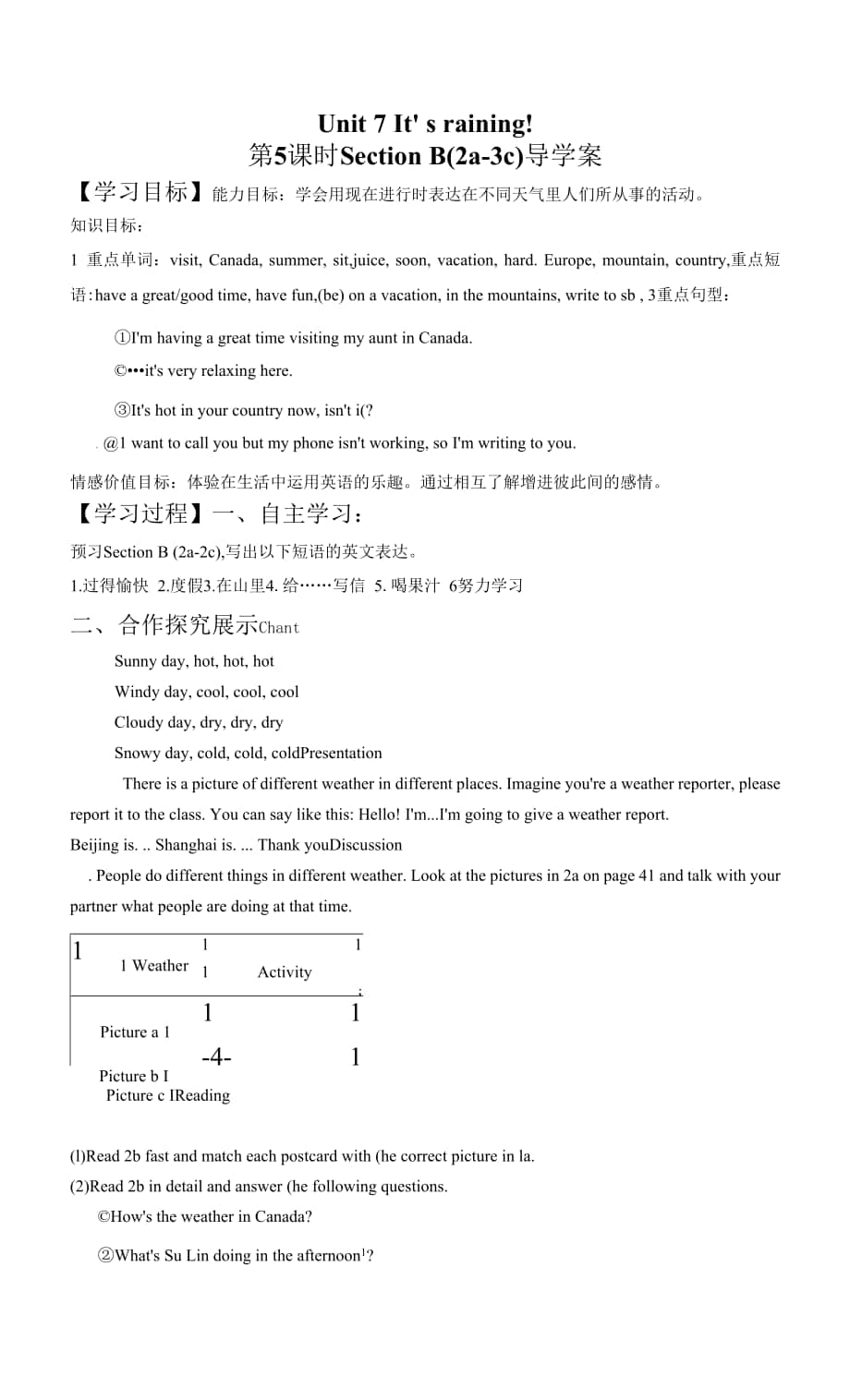《新人教版七年級英語下冊Unit 7 It’s raining! 第5課時(shí) Section B(2a-3c)導(dǎo)學(xué)案.docx》由會(huì)員分享���,可在線閱讀���,更多相關(guān)《新人教版七年級英語下冊Unit 7 It’s raining! 第5課時(shí) Section B(2a-3c)導(dǎo)學(xué)案.docx(3頁珍藏版)》請?jiān)谘b配圖網(wǎng)上搜索���。
1、Unit 7 It' s raining!
第5課時(shí)Section B(2a-3c)導(dǎo)學(xué)案
【學(xué)習(xí)目標(biāo)】能力目標(biāo):學(xué)會(huì)用現(xiàn)在進(jìn)行時(shí)表達(dá)在不同天氣里人們所從事的活動(dòng)���。
知識目標(biāo):
1 重點(diǎn)單詞:visit, Canada, summer, sit,juice, soon, vacation, hard. Europe, mountain, country,重點(diǎn)短語:have a great/good time, have fun,(be) on a vacation, in the mountains, write to sb , 3重點(diǎn)句型:
①I'm having a great
2���、time visiting my aunt in Canada.
????it's very relaxing here.
③It's hot in your country now, isn't i(?
. @1 want to call you but my phone isn't working, so I'm writing to you.
情感價(jià)值目標(biāo):體驗(yàn)在生活中運(yùn)用英語的樂趣。通過相互了解增進(jìn)彼此間的感情���。
【學(xué)習(xí)過程】一���、自主學(xué)習(xí):
預(yù)習(xí)Section B (2a-2c),寫出以下短語的英文表達(dá)���。
1.過得愉快 2.度假3.在山里4.給……寫信 5.喝果汁 6努力
3、學(xué)習(xí)
二���、合作探究展示Chant
Sunny day, hot, hot, hot
Windy day, cool, cool, cool
Cloudy day, dry, dry, dry
Snowy day, cold, cold, coldPresentation
There is a picture of different weather in different places. Imagine you're a weather reporter, please report it to the class. You can say like this: Hello! I
4���、'm...I'm going to give a weather report.
Beijing is. .. Shanghai is. ... Thank youDiscussion
. People do different things in different weather. Look at the pictures in 2a on page 41 and talk with your partner what people are doing at that time.
1
1 Weather
1
1
1
1
Activity
i
Picture a 1
5、
1
1
1
1
-4-
1
Picture b I
Picture c IReading
(l)Read 2b fast and match each postcard with (he correct picture in la.
(2)Read 2b in detail and answer (he following questions.
?How's the weather in Canada?
②What's Su Lin doing in the afternoon1?
③How's the weather in Europe?
@Wha
6���、t are Dave's family doing in the afternoon?
(3)Fill in the chart of 2c.
Read the postcards that Su Lin and Dave write to Jane in 2b again Find the answers to the questions:
Where are they? How- s the weather? What are (hey doing?
三���、拓展提升.rm having a great time visiting my aunt in Canada.我在加拿大看望姨
7、媽過得很愉快���。
【導(dǎo)學(xué)】have a great time意為“玩得高興���,過得愉快”,其后接動(dòng)詞的現(xiàn)在分詞形式���。同義 短語為 have a good time, have fun, enjoy oneself���。如:
We all have a great/good time in our holidays.在假期我們都過得很愉快���。
The children have fun swimming in the river in summer.夏天孩廣們在河里游泳很開心。 【學(xué)點(diǎn)訓(xùn)練】我們在美麗的花園里玩得很開心���。
We are a time in the beautiful garden
8���、.
1 .…It、very relaxing here.這兒讓人很放松���。
【導(dǎo)學(xué)】relaxing意為“令人放松的"。其主語通常是物���。
【拓展】(1) relaxed意為“感到放松的”,主語通常是人���。常用搭配be relaxed at.…(對…… 而感到放松的)。如:
I am relaxed at this piece of soft musi.這首輕音樂讓我感到很放松���。
(2)相同用法的詞還有:interesting, interested; exciting, excited; boring, bored; tiring, tired; surprising, surprise
9���、d . -ing形式與物搭配使用���,ed形式與人搭配使用。如: This is an interesting film .這是一部很有趣的電影���。
I am not interested in this movie at all.我對這部電影一點(diǎn)也不感興趣���。
The surprising news is from Tom.這個(gè)驚人的消息是從湯姆那里發(fā)出來的。
We are surprised at the good news.這個(gè)好消息讓我們感到很驚訝���。
【學(xué)點(diǎn)訓(xùn)練】①People are at the music (relax)
②We are about an. match (exc
10���、ite)?Hc is in an joh.(intcrcst)
2 . Ids hot in your country now, isn't it?你們國家現(xiàn)在很熱,對吧?
【導(dǎo)學(xué)】這是一個(gè)反意疑問句���,是由陳述句和附在其后的疑問局部組成���,其中附加疑問部 分翻譯為“對吧,是吧"���?��;卮饡r(shí)���,如果情況屬實(shí),用Yes加上疑問局部的倒裝肯定形式���; 假設(shè)果情況不屬實(shí)���,那么用N。加上疑問局部的倒裝否認(rèn)形式���?��!究纱鹕暇鋾r(shí),情況屬實(shí):Yes, it is.情況不屬實(shí):No, it isn't.再如:
—They arc late for the meeting, aren't they?他們開會(huì)遲到了,是吧
11���、?
—Yes they are./No, they are n't.是的,他們遲到了���。/不���,他們沒有遲到。
【學(xué)點(diǎn)訓(xùn)練】完成反意疑問句���。
①She is a lovely girl, ?
②Your father plays the computer very well, ?
四���、檢測反應(yīng)I.根據(jù)句意及提示完成句子���。
1. .The radio says it's going to be r tomorrow. Please put on your raincoat.
2. Jane is v her best friend.
3. They're making a s
12、in the snow.
4. --What are you doing?-…I'm (滑冰).
5. It's very cold outside. Please wear w clothes.
6. The children are going swimming now. Because it's so h today.
7. --What's the weather like today? --It,s very d.
8. The students are listenjng to music. It's really very (放松).
9. These people
13���、are (take) photos in the park.
10. The children arc having a great time (play) ping-pong on the playground.
11. 補(bǔ)全對話���。(其中有兩項(xiàng)多余)A: Jim! 1. B: I'm reading an English book.
A: Can you come here, please! 2.
B: Certainly, Mum! 31 Oh, what are you making?
A: 4. B: Let me help youMum52A: Let's put the cakes on that table.B: OK, Mum!
 新人教版七年級英語下冊Unit 7 It’s raining! 第5課時(shí) Section B(2a-3c)導(dǎo)學(xué)案.docx
新人教版七年級英語下冊Unit 7 It’s raining! 第5課時(shí) Section B(2a-3c)導(dǎo)學(xué)案.docx

